You can receive up to 85% of your childcare costs from the Government. In this article Cashfloat provides you with all the information you need to know to claim your free child care. Read on to find out more…
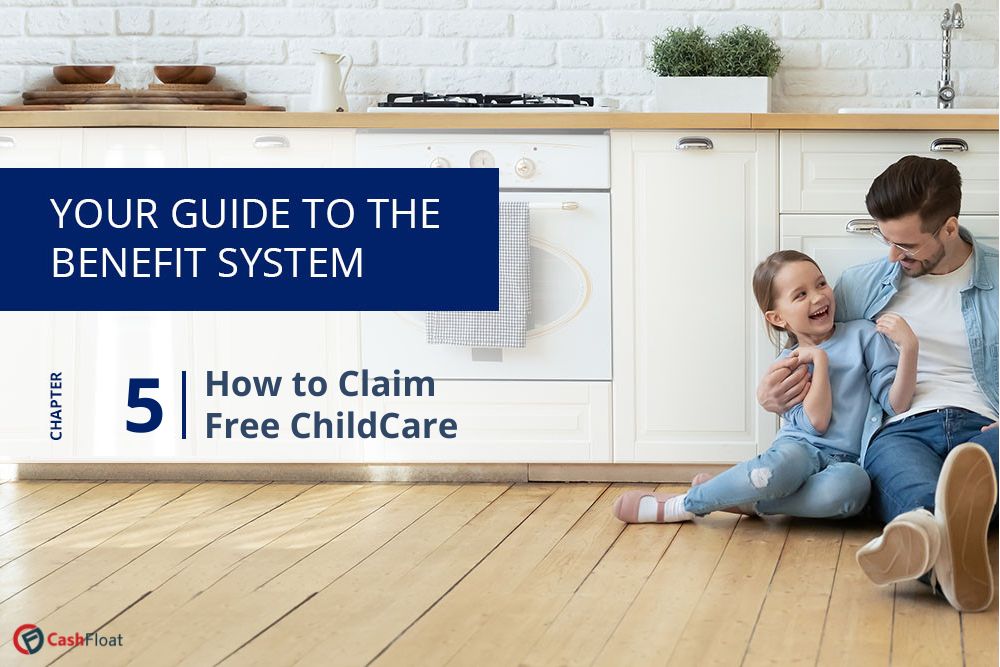
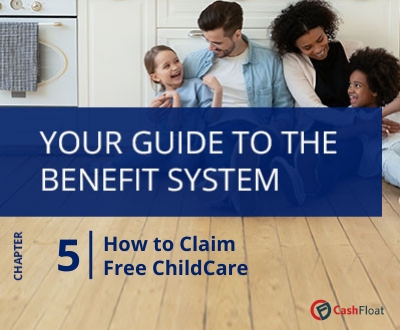
- The cost of childcare is one of the main reasons for parents being unable to work in the UK.
- Up to 85% of your childcare costs can be paid by the state.
- You can receive free childcare if you are studying.
In this chapter, we will explain all of the different types of help which are available from the UK government to pay for childcare. The first part of this chapter explains some of the basic rules about applying for free childcare from the government and also explains when you could receive money if your child is cared for by a relative.
The second part looks at free childcare available for working parents who do not receive Universal Credit. After that, we explain what help is available to working parents who qualify for Universal Credit. Finally, we explain how employers can help with childcare and what childcare is available for parents who are in education.
Free Childcare for Working Parents
The cost of childcare is one of the main reasons why some parents are unable to work in the UK.
Unfortunately, single parents and even those with a partner often struggle to make ends meet and turn to easy payday loans because they are unable to afford the cost of childcare which would allow them to work instead. However, help is available from the state for working parents, however many hours they work.
- Most working families in the UK, including the self-employed, whose income is too high to qualify for Universal Credit are entitled to tax-free childcare.
- In England, the same families will be entitled to up to 30 hours of free childcare per week for 38 weeks of the year, for a child aged 9 months(as of September 25 to 4 years. Similar schemes are available in Scotland, Wales and Northern Ireland.
- Working families who are eligible for Universal Credit can receive 30 hours of free childcare and can have up to 85% of the costs of any childcare that they do pay for covered by Universal Credit.
- Some families in the UK are entitled to 15 hours per week of free childcare for 2 year old children.
- In order to receive government support, your childminder must be recognised by the state as an approved childcare provider.
- In some circumstances you can receive financial support even if your childcare provider is a family member.
- Employers can sometimes help with childcare costs by giving directly contracted childcare or by the provision of a staff nursery.
| The average cost of childcare in the UK | ||
|---|---|---|
| Part time (25 hrs per week) | Full time (50 hrs per week) | |
| A registered childminder | £118 per week | £233 per week |
| A day nursery | £131 per week | £252 per week |
Childcare Provided By A Relative
Some parents live near relatives and can have their children cared for by a family member. Did you know that you could get some of your childcare costs covered in certain circumstances if your childminder is a family member?
If you live in England, Scotland or Wales, you will be eligible for tax-free childcare if your relative:
- Is a registered childminder.
- Cares for your child outside your home.
In Northern Ireland, your relative must:
- Be in a childcare approval scheme.
- Care for the child outside your home.
- Look after at least one other child who is not related to you.
Unfortunately, you cannot apply for 15-30 hours free childcare from the government if that childcare is provided by a relative. How easy is it to become a registered childminder?
Becoming a registered childminder is a complicated process and so it is usually only useful to claim for tax-free childcare from a relative if that person is already a registered childminder.
Childcare Provided By An Organisation
The government will only cover the costs of childcare provided by approved childcare providers and so it is useful to know what an approved childcare provider is.
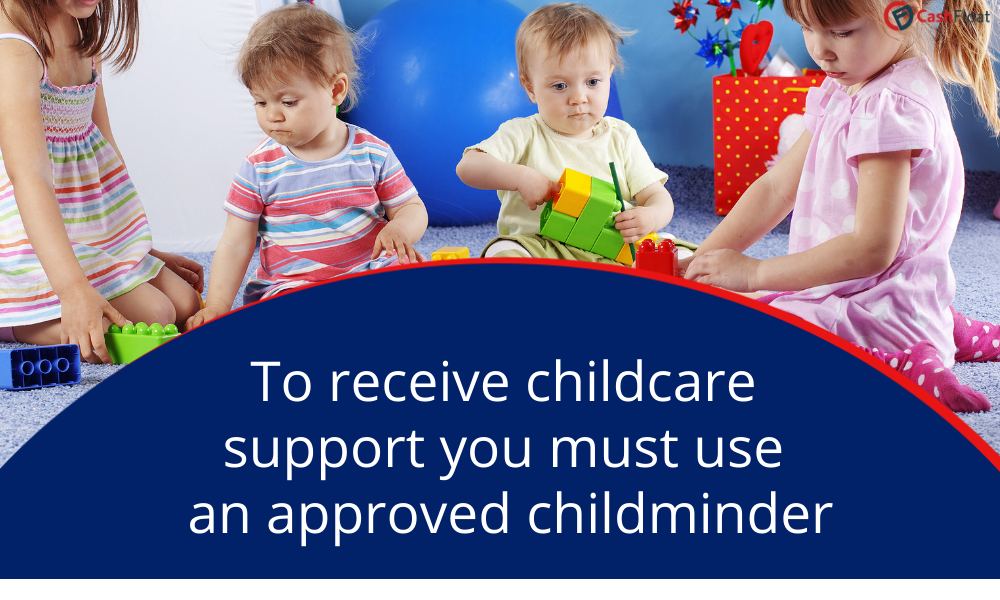
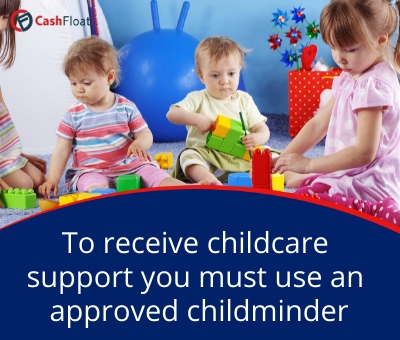
Approved Childcare Providers include:
- A registered childminder, playscheme, nursery or club
- A childminder or nanny with an Ofsted-registered childminding or childcare agency
- Registered schools
- A home care worker employed by a registered home care agency.
Checking whether your childcare arrangements are approved is different according to which part of Britain you live in. Use the table below to find which organisation your childcare providers need to be registered with.
| How to check if your childminder is registered | |
|---|---|
| Location of Childminder | Organisation they must be registered with |
| England | Ofsted |
| Wales | Welsh Care Inspectorate |
| Scotland | Scottish Care Inspectorate |
| Northern Ireland | Local early years team register |
Free Childcare for Working Parents who do not Receive Universal Credit
Ordinary working parents, who do not claim Universal Credit, or childcare vouchers are entitled to help from the government to pay for their childcare. The main types of help available are tax-free childcare and the actual provision of up to 30 hours of childcare and early education. When you apply for tax-free childcare, you will also find out if you are eligible for 30 hours of free childcare and early education.
Most parents in the UK will be able to receive 30 hours of free childcare for a child of 9 months to 4 years old as of September 2025.
Here we’ll explain what ordinary people can expect to receive.
Tax-Free Childcare
Ordinary working parents, who do not receive Universal Credit, or childcare vouchers, and earn between £196.36 per week and £100,000 per year are entitled to tax free childcare for children up to the age of 11. If this is you and you pay for any of your childcare, then you should apply for tax-free childcare.
Who is Eligible?
Most working families in the UK, including the self employed, are entitled to tax-free childcare. To be eligible:
- You and your partner must earn at least the National Minimum Wage (£139 per week based on a 16 hour working week for people over the age of 25)
- Neither you or your partner can earn over £100,000 per year
- Neither you or your partner can be claiming Universal Credit, or childcare vouchers
- One parent must have a national insurance number and the correct immigration status

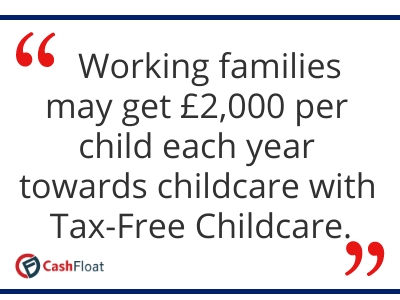
How it Works
To claim tax-free childcare, you have to set up a childcare account with the government, which you can use to pay your childcare provider. For every £8 that you pay into the account, the government will add another £2, up to £2000 per year for each child.
When you set up a childcare account, you will also find out if you are eligible for 30 hours of free childcare for a 3-4 year old child.
Free Childcare & Early Education For Children Aged 3-4
Every working family in England with a child aged 3-4 is entitled to at least 15 hours of free childcare per week for 38 weeks of the year, even if they don’t qualify for Universal Credit or other benefits. There are also similar schemes in Scotland, Wales and Northern Ireland. Most working families in England are also entitled to an additional 15 hours on top of this, making a total of 30 hours of free childcare, with a similar allowance existing in Wales. Some working families in the UK may also be entitled to 15 hours of free childcare for 2 year old children.
To be eligible for 30 hours of free childcare per week for 3-4 year olds:
- Each parent must earn at least the National Minimum wage (£139 per week if they are over 25)
- Neither parent can have an income of over £100,000 a year
- Neither parent can have an income of over £100,000 a year
- You must be using the free childcare to enable you to work
- One parent must have a national insurance number and the correct immigration status
The date your child can start on free child care depends on the beginning of term which follows the date of their 3rd birthday. Use the table below to see when you can start claiming free childcare:
| When can I start claiming free childcare? | |
|---|---|
| Month your child was born | Term you can start claiming |
| January to March | Term beginning in April |
| April to August | Term beginning in September |
| September to December | Term beginning in January |
Free childcare and education stop when your child starts reception class at a state school. So you should bear this in mind and make alternative arrangements when they start school.
What parents who do not qualify for any benefits are still eligible for 15 hours of free childcare per week for 2 year old children?
Normally, an allowance of 15 hours of free childcare per week is only available to parents who qualify for Universal Credit. However, if you do not receive benefits, but your child meets certain criteria then you may be entitled to receive this allowance.
Free Childcare for Working Parents who Receive Universal Credit
Working parents who qualify for Universal Credit are eligible for extra help from the state to pay for childcare.
Universal Credit & Free Childcare
Parents who qualify for Universal Credit are entitled to free childcare and can have up to 85% of any additional costs for childcare paid for by the government. The amount of free childcare and the amount of cost that they can have covered depends on their circumstances.
What can Parents on Universal Credit Receive?
- Parents on Universal Credit can usually receive 15 hours per week of free childcare for 38 weeks of the year for 2 year old children. In order to receive this, their household income must be no more than £15,400 per year.
- In England, all parents, including those on Universal Credit, are entitled to 15 hours of free childcare per week for 38 weeks of the year for children aged 3-4. Similar schemes exist in Scotland, Wales and Northern Ireland.
- Parents on Universal Credit may also be entitled to receive the extra allowance of 15 hours of free childcare per week for children aged 3-4, making a total of 30 hours of free childcare. Normally, they will qualify for this if both parents, or the sole parent in a single parent household, earns over the National Minimum Wage.
- Parents on Universal Credit cannot receive tax-free education. However, some are able to reclaim up to 85% of the costs of any childcare that they pay for in their Universal Credit payment. This applies to childcare for a maximum of 2 children up to the age of 16.
How it Works
- Any free childcare which parents on Universal Credit claim for must be provided by an approved childcare provider.
- Many parents on Universal Credit will be eligible for 15 hours of free childcare for 2 year olds and 30 hours of childcare for 3-4 year olds.
- If they are eligible, parents on Universal Credit can also reclaim any additional expenses they make on childcare and receive the money back in a future Universal Credit payment.
| How much can parents on Universal Credit receive to cover additional childcare costs? | |
|---|---|
| Number of Children | Amount |
| One Child | £646.35 |
| 2 or more children | £1108.04 |
What to do
Parents who are eligible for Universal Credit should apply. You can use the benefits calculator to see how much you could receive. On top of this, you should also apply for 15 hours of free childcare for a 2 year old or 30 hours of free childcare for a 3-4 year old. Parents in Scotland, Wales or Northern Ireland should apply to the relevant scheme in their country.
If you already receive Universal Credit and you need to make a new claim for childcare, then you should report the relevant change in your circumstances to the government.
Childcare Provided By Your Employer
Previously, many employers helped with childcare costs by providing childcare vouchers and ‘directly contracted childcare’. Childcare vouchers were vouchers which employees could use to pay for childcare and directly contracted childcare was childcare, arranged with a registered childcare provider, by an employer for their employees. The government ran schemes which employers would have to join in order to provide childcare vouchers or directly contracted childcare.
Tax-free childcare was introduced in 2017 as an alternative and no new applicants were allowed to join childcare voucher or directly contracted childcare schemes after 2018.
However, some employers who enrolled on childcare voucher and directly contracted childcare schemes are still able to provide it. While people who claim tax-free childcare are not allowed to use childcare vouchers or directly contracted childcare, some people may find it is easier and more cost effective to take advantage of childcare voucher schemes and directly contracted childcare than to claim for tax-free childcare. If your employer is able to provide childcare vouchers or directly contracted childcare, then check and see if you would better off receiving these or with tax-free childcare.
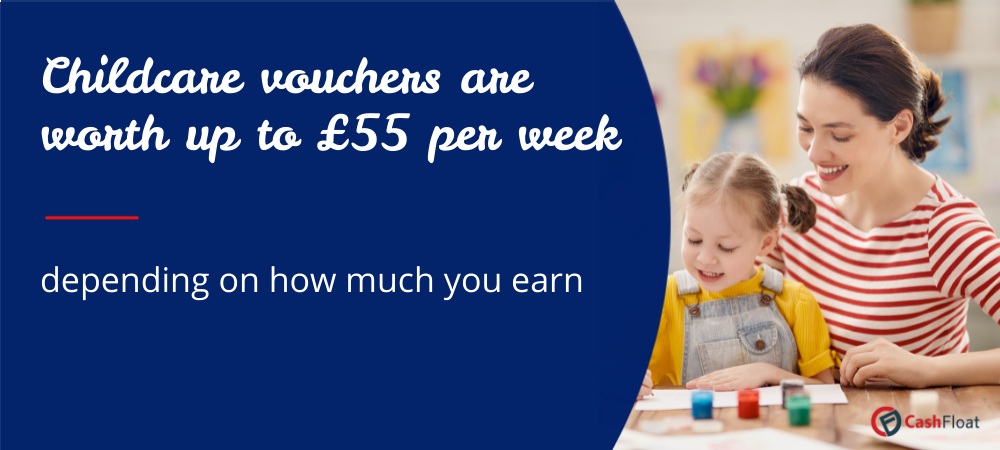

Some employers are able to provide staff nurseries or to pay childcare or schooling as an employment benefit on top of a salary. Employment benefits can help with the cost of childcare, although you may need to pay tax on them, as they count as earnings. If your employee pays your childcare provider or your child’s school fees directly, then you may need to pay tax on this money.
Can I apply for financial assistance if my partner looks after my child? No. Although you may receive help under certain circumstances if a family member is your childminder, this does not apply to your partner.
Can I have the full costs of childcare paid for by the state? No. Depending on your circumstances and income, the most you can receive is 85% of your childcare costs.
Under which circumstances can a 2 year old child receive free childcare and education? You can receive free childcare and education for a 2-year-old child if you are receiving Universal Credit. On top of this, if you do not qualify for any benefits you can receive free childcare for a 2 year old child if they are looked after by a local authority, if they have statement of special needs, if they have an EHC plan, if they get Disability Living Allowance or if they have left care under an adoption order, a special guardianship order or a child arrangements order.
Free Childcare For Parents In Education
Did you have to leave school because of pregnancy? Or, are you planning to take an occupational qualification or a degree but don’t know how you can afford to pay for childcare?
Many people in the UK are unable to stop working so they can finish their education because of the prohibitive cost of childcare. This is one of the main reasons why people get stuck in low-paid jobs. It’s a vicious cycle that ultimately leads people into debt and rely on small personal loans for bad credit. Whether you wish to finish secondary education or complete a qualification, help is available from the state for you to improve your career prospects.
Options of free childcare for parents in education include:
- ‘Care to Learn’ pays childcare costs for students under 20 who are enrolled on a publicly-funded course in a school or sixth form college. Applications for ‘Care to Learn’ are made online and must be renewed every year.
- Learner Support is available for students aged 19 or over who suffer financial hardship while doing a further education course. If the cost of childcare is causing you financial hardship, then you could receive extra support. Applications should be made to your learning provider (for example, to your college).
- Childcare Grants are supplementary payments for students in higher education, which are paid on top of any student financing, such as loans. These can be given to parents who have children under the age of 15, or 17 if they have special educational needs, and they do not have to be repaid.
You are eligible for help with childcare from the ‘Care to Learn’ scheme if you are a parent and you were aged under 20 when you started a publicly-funded course at a school or sixth-form college in England. Unfortunately, this scheme does not cover Scotland, Wales or Northern Ireland. However, students in these countries may be able to receive Education Maintenance Allowance.
How to claim for Care to Learn
To claim for the ‘Care to Learn’ Scheme you will need to provide;
- Proof from your childcare provider confirming your child’s attendance.
- A letter of confirmation from your school or college that you are attending a course.
- Your childcare provider’s Ofsted registration number and contact details.
| Who to apply with | Student Bursary Support Service (which is part of the Education Funding Agency) |
| If this is your first claim | Online at the Student Bursary Support Service |
| If you have already claimed | Login to your student bursary account to renew your claim. You will need to renew your claim for each year that you study your course. |
| Email for Student Bursary | caretolearn@studentbursary.education.gov.uk |
| Phone Contact for Student Bursary | 0800 121 8989 between 9.00am and 5.00pm Monday to Friday. |
The weekly payment covers your childcare (both deposit and registration fees), the cost of keeping your child’s place open and if necessary, the cost of your child being taken to the childcare provider. However, your child must be in an approved childcare center.
| How much can I receive under the Care to Learn Scheme? | |
|---|---|
| Inside London | £175 per week |
| Outside London | £160 per week |
If your course lasts longer than an academic year, you will need to renew your application every year. This can be done online using your username and password.
Discretionary Learner Support is a government benefit for students who are struggling financially. Under this scheme you can get help with accomodation, travel, equipment and books and, also, childcare.
To be eligible for Learner Support you must be:
- Over the age of 19.
- Enrolled at a learning provider which is funded by the Education and Skills Funding Agency.
If you are under 19, you would come under the ‘Care to Learn’ scheme which is discussed above.
How to apply for Learner Support
To receive your Learner Support, you should apply to the student support services of your learning provider. The amount you receive will be decided by your learning provider and depends on your circumstances. Any payment you receive could take the form of a direct payment, a loan or a payment to a third party (such as your childcare provider.)
A Childcare Grant can only be paid if you are on an approved course in higher education (such as a degree course), are eligible for student finance (e.g. student loans) and have a child under the age of 15 (or 17 if they have special educational needs).
This grant to cover childcare does not have to be repaid and is given in addition to any other financing you receive to complete your course. It is paid in three instalments, usually at the beginning of each academic term. You can receive up to 85% of your childcare costs. But, the final payments depend on your household income, childcare costs and the number of dependent children you have.
| What is the most I can receive in free childcare if you are in education? | |||
|---|---|---|---|
| Care to Learn | Learner Support | Childcare Grant | |
| First child | £175 per week | Up to £6000 per year | £174.22 per week |
| 2 or more children | £175 per week | Up to £6000 per year | £298.69 per week |
How soon should I apply for the ‘Care to Learn’ scheme? You should apply before your course starts or within 28 days of it starting otherwise, your childcare provider will only be paid from the beginning of the week when your application is received.
Can I receive Learner Support if I also receive a Disability Living Allowance? Yes, you are eligible for Learner Support even if you receive a Disability Living Allowance, ‘Care to Learn’ or any career development loan. However, you are not entitled to it if you get any student financing or attend a Community Learning course.


